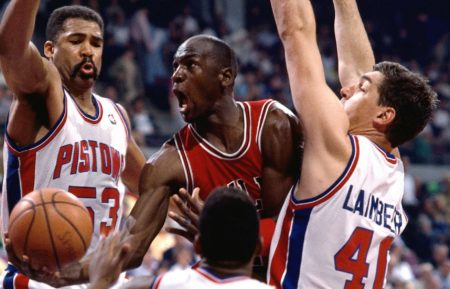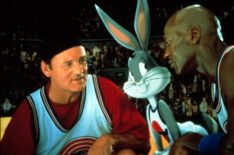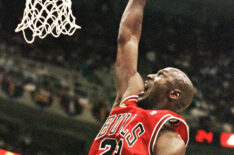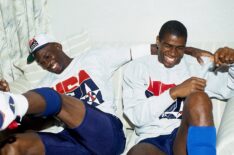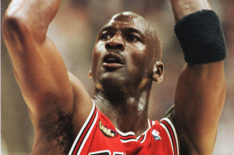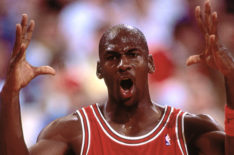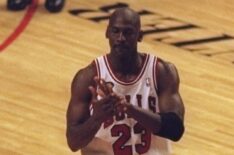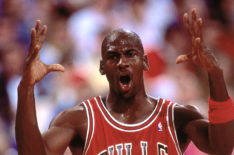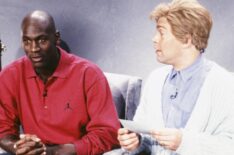Michael Jordan

Basketball Player • Businessman
Birth Name: Michael Jeffrey Jordan
Birth Date: February 17, 1963
Age: 62 years old
Birth Place: Brooklyn, New York
Sportswriters spare no superlatives on Michael Jordan, a 6'6" shooting guard whose unearthly talents took him to the heights of commercial celebrity and dominance in the sport of basketball and made him oft-labeled the player of all time. Jordan leapt onto the national stage with a last-second jump-shot to seal UNC's 1982 NCAA Championship.
Drafted by the Chicago Bulls in 1984, he lit up the National Basketball Association with gravity-defying dunks and acrobatic scoring bursts. He became the league's perennial scoring leader, but it would take the mentoring of coach Phil Jackson to add substance to Jordan's flash. He morphed into a true team player in leading the Bulls to their first-ever title in 1991.
Jordan drove the Bulls to five more championships through 1998, interrupted only by Quixotic mid-career "retirement" to take a shot at big-league baseball. A true celebrity, he became a ubiquitous presence in advertising and even starred in a big-budget film alongside Bugs Bunny. After retiring and taking a front-office job with Washington Wizards, he suited up again in 2001 for a much less successful stint with that team.
In 2010, he bought majority ownership of the Charlotte Bobcats, but his tenure would be much-maligned. A one-man marketing institution, 14-time All-Star, five-time NBA MVP, ten-time scoring champion, six-time Finals MVP and the only athlete to grace the cover of Sports Illustrated 47 times, Jordan left an almost superhuman legacy.
He was born Michael Jeffrey Jordan on Feb. 17, 1963 in Brooklyn, NY, the fourth of five children of James and Deloris Jordan. Not long after, the family moved to Wilmington, NC, where Michael would grow up. He developed an early affinity for sports, particularly baseball, and became a standout Little League pitcher, tossing no-hitters when he was just 12 years old.
His team even came within a game of making it to the Little League World Series. He began honing his basketball talents in efforts to compete with older brother Larry, who routinely beat him in one-on-one games. It was just one catalyst in Jordan's development of a fierce competitive streak.
Another came at Wilmington's Laney High School when he failed to make the varsity basketball squad his sophomore year as a 5'11" guard. Michael grew four inches in the off-season, worked obsessively on his game, and returned to the team the next year, transformed into a 20-plus points-per-game scorer.
As a 6'5" senior, Jordan torched opponents, averaging what was normally a rare on-court performance for any other player, a triple-double: 29.2 points, 11.6 rebounds, and 10.1 assists per game. Named a McDonald's All-American, Jordan was heavily recruited by major universities but chose to stay home and join coach Dean Smith's storied program at the University of North Carolina in Chapel Hill.
Matriculating at UNC in 1981, he scored 13.4 points per game and earned the Atlantic Coast Conference's Freshman of the Year laurel. The star-studded UNC team went to the NCAA Final Four and, ultimately, the championship game against Georgetown. Jordan put an exclamation point on the game with a late jump-shot to give the Tarheels the lead and the title.
He would up his average to 20 ppg and be voted a First Team All-American in 1983 and 1984 and garner the Naismith and Wooden College Player of the Year awards in 1984. His college stat-line would later inspire the joke that the best defense ever played against Jordan was Dean Smith's offense. Jordan declared for the NBA draft after his junior year and was selected by the Chicago Bulls with the No. 3 overall pick.
He joined the U.S. national team that summer and helped it win gold at the 1984 Los Angeles Olympics. Donning a Bulls uniform, he dazzled sports media and fans as a slashing, soaring scorer - with a curious trademark of sticking his tongue out as he made his moves - and averaged 28.2 ppg in his first season.
He became such a media spectacle that, upon Jordan's selection to the East team for the NBA's annual All-Star Game, Detroit Pistons point guard Isiah Thomas reportedly coordinated a "freeze-out" amongst a contingent of East players, who agreed to not pass the young upstart the ball. It was the beginning of a bitter rivalry between Jordan and Thomas. For all of Jordan's firepower, the Bulls struggled as a team.
After breaking a foot, he missed the majority of the 1985-86 season. He healed in time for the playoffs, where the Bulls drew perennial Eastern powerhouse the Boston Celtics. The Celtics swept the series, withstanding Jordan's playoff-record 63 points in Game 2. The Celtics' future Hall-of-Fame forward Larry Bird told reporters after the game, "That was God disguised as Michael Jordan."
Athletic-wear marketer Nike further built his iconic status by featuring him in some of the edgiest advertising of the time, as paired with filmmaker Spike Lee in the guise of his film character Mars Blackmon, the ultimate smack-talking fan. American youth anticipated annual new designs of Air Jordan sneakers each fall as if an automotive new model year, and Nike eventually expanded the imprint into an apparel sub-brand.
Jordan averaged 37.1 points per game in the 1986-87 season, becoming the only NBA player other than 1960s great Wilt Chamberlain to score 3,000 points in a single season. But it bespoke an imbalance to the Bulls offense as the team failed to reach a .500 win percentage and again suffered a first-round playoff loss. He led the NBA in scoring again with 35 ppg in the 1987-88 season and dug in as a defender, averaging a league-best 3.16 steals a game as well as 1.6 blocked shots, an unheard of figure for a guard.
With the Bulls improving to a 50-32 record, Jordan earned his first MVP trophy as well as the NBA's Defensive Player of the Year Award. The Bulls made it to the Conference Semifinals and a shot at the Pistons, then known as the "Bad Boys" for physically tough play, led by Thomas, center Bill Laimbeer and forward Dennis Rodman. The Pistons sent the Bulls packing in what became an annual rite for the Eastern Conference playoffs.
Conference Finals rematches with the Pistons in 1989 and 1990 ended in bruising losses highlighted by cheap shots and almost-brawls, as the Bad Boys went on to win back-to-back NBA titles. But with young forwards Scottie Pippen and Horace Grant developing, catalyzed by the firing of head coach Doug Collins and promotion of Phil Jackson to the job, the team had begun to gel.
In spite of Jordan's proliferating product endorsements - he appeared in voluminous ads for Gatorade, Coca-Cola, McDonald's, Wheaties and Hanes - and correlative Boy Scout image, professionally his ego grew with his skills and he developed a reputation as a trash-talking terror on court and a me-first player as a teammate. A Buddhist with a holistic sense of the game, Jackson brought a new temperament to the top-heavy Bulls, and Jordan's game shifted noticeably. The 1990-91 season saw him garner his second MVP laurel and, as importantly, become adept at drawing defenses and finding teammates for open shots. In the Eastern Conference Finals, the Bulls crushed the Pistons in a four-game sweep - spurring an infamous moment when Thomas led Pistons starters off the court before time expired without shaking the winners' hands - and went on to face the Los Angeles Lakers in the Chicago franchise's first-ever NBA Finals appearance. Jordan and Pippen's relentless defense shut down Lakers superstar Magic Johnson and, in the clinching Game 5, Jordan again and again dished to guard John Paxson for open jump-shots in the fourth quarter to ice the game and Bulls' first NBA title. Jordan averaged an astounding 11.4 assists per game, plus 6.6 rebounds and 2.8 steals, along with his 31.2 ppg to win the Finals MVP award.
Over the hump, the Bulls dominated the next two seasons. Jordan took the regular-season MVP again in the 1991-92 season and returned to the Finals to face the Portland Trailblazers. Game 1 against the Blazers saw Jordan unveil new weaponry in his already formidable arsenal, sinking six three-point shots and scoring 35 points in the first half - a Finals record. The Bulls would win in six games. That summer, Jordan coalesced with a never-before-seen array of talent as the U.S. national team for the first time drew from pro players, forming what went heralded as the "Dream Team" for 1992 Barcelona Olympics. Jordan and Pippen joined Hall-of-Famers like Charles Barkley, Magic Johnson, Larry Bird, David Robinson, Karl Malone and John Stockton - Isiah Thomas conspicuously went uninvited, a snub rumored to be at Jordan's request, among other players - scorching international competition, and the team easily won the gold.
The Bulls again stormed to the Finals in 1993 to square off with Jordan's off-court buddy Barkley. The much-hyped match between the two superstars made it the most-watched NBA Finals in league history, and Jordan set another Finals record by averaging 41 ppg and drawing his third Finals MVP as the Bulls won in six. In the summer of 1993, Jordan's life, cluttered with blanket media coverage, multiplying product endorsements and ad appearances, was turned upside down when his father was found murdered in North Carolina. As the NBA prepared for a new season that fall, Jordan made global headlines by announcing his retirement. He said he hoped to honor James Jordan's onetime dream for Michael to play Major League Baseball, and Bulls owner Jerry Reinsdorf, also owner of the Chicago White Sox, acceded to put him on contract. Jordan went into the ChiSox' farm system for stints with the Birmingham Barons and Scottsdale Scorpions minor league clubs, but his talents proved less than Major League. Late in the 1994-95 season, he announced he would return to the Bulls. It injected some excitement into the struggling Bulls team and drew huge television numbers for the league, but Orlando ousted them in the playoffs' second round.
The next season, the Bulls added a new power forward: their old Pistons nemesis Rodman. Jackson again worked karmic magic in making the talents gel. The team racked up a phenomenal 72-10 record, the best regular-season tally in NBA history. Jordan resumed his 30 ppg scoring clip, won All-Star Game MVP trophy and the league's regular-season MVP laurel, and secured his fourth Finals MVP after the Bulls defeated the Seattle Supersonics for the title. Jordan's Arthurian return also gave rise to a movie project, "Space Jam" (1996). Building on high-profile Nike ads that had paired Jordan with Bugs Bunny, the Warner Bros. film saw Jordan transported into a cartoon dimension in order to help Bugs and his Looney Toons friends win their freedom from space aliens in an all-or-nothing basketball game. A cross-promotional event with most of Jordan's endorsees tied in, the film barely made its budget back with its $90 million U.S. box-office take, but it bore out Jordan's global drawing power by making $140 million overseas. The Bulls returned to the Finals of the 1996-97 season to take on the Utah Jazz. Jordan put on one of the most memorable performances in the history of sports in Game 5 of the series in what became known as "The Flu Game." He played in spite of a stomach virus that left him weak, dehydrated and at one point requiring physical help from Pippen to make it back to the bench. Jordan somehow found his gear as the play resumed and scored 38 points, including a last-second three-pointer to ice the game, giving the Bulls a 3-2 lead in the series. They would seal it the next game.
Jordan took another regular-season MVP trophy the next year, and the Bulls took their sixth title, again versus the Jazz. NBC's broadcasts of Jordan's final title run set a new ratings record for the NBA Finals. But in the off-season, Bulls management made the controversial decision not to re-sign Jackson. An irked Jordan decided not to return for the 1998-99 season. The previous summer, Forbes magazine had run a cover story breaking down his contribution to the NBA as a financial asset in his time in the league, attributing some $10 billion in revenues to Jordan's presence. The next year, Jordan purchased a stake in the Washington Wizards franchise and donned title of president of basketball operations. In the off-season of 2001, he hired his old coach Collins to helm the Wizards and began training for a second comeback. He suited up with the Wizards for the 2001-02 season to much ballyhoo and put up 22.9 ppg in an injury-shortened season.
Jordan's 13-year marriage to wife Juanita hit the rocks in 2002 as they filed for divorce, though they would decide to reconcile. Though he turned 40 during the 2002-03 season, he showed he was still able to put up 20 ppg, but the Wizards continued to struggle. Not used to losing, Jordan openly criticized teammates on a team that he had put together, and it became increasingly evident the season would be his last. The Wizards became the NBA's hottest roadshow and sold out opposing arenas as Jordan drew standing ovations. He played his final game at Philadelphia on April 16, 2003, scoring 15 points. His retirement took on a sour note when Wizards owner Abe Pollin fired Jordan from his front-office post. In 2006, Jordan's personal life made tabloids again when a former lover sued him for $5 million. The suit claimed she and Jordan had had an affair in 1991 and he had promised her that sum as a payoff to not file a paternity suit when she became pregnant. A DNA test proved Jordan was not the child's father, but he and Juanita divorced that year. Also in 2006, Jordan returned to NBA front-office spheres when he purchased a stake in the Charlotte Bobcats and took the helm of basketball operations. In 2009, Jordan was inducted into the Basketball Hall of Fame. In 2010, he bought out Bobcats majority owner Robert L. Johnson. It marked the first time in NBA history that a former player had become a majority owner in a franchise. During the owner lockout that pushed back the 2011-12 NBA season, Jordan drew harsh criticism for siding with a hardliner group of team owners pushing to curtail the players union's share of basketball related income. That and the Bobcats' miserable record - exacerbated by an ongoing tradition of failed draft picks begun during his Wizards tenure - drew a number of sport writers to speculate that Jordan might be the worst owner-general manager in the league.
Things were better on the personal front when in late-2011, Jordan announced his engagement to Puerto Rican model Yvette Prieto. Charlotte Bobcats became Charlotte Hornets at the beginning of the 2014-15 season. In June of 2023, Jordan announced he has agreed to sell his majority stake in the Charlotte Hornets, but will remain a minority stake after the sale is completed.
Credits

A Life in Television: Dick Ebersol
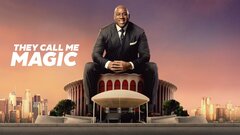
They Call Me MagicStream

Kobe Bryant The Greatest of All
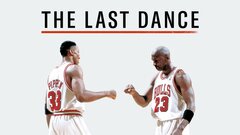
The Last DanceStream

The Last DanceStream

David Blaine: The Magic Way

Meeting Michael

Today 3rd Hour

The Immortals

Michael Jordan - från basket till baseboll

Ahmad Rashad

Secret Lives of the Super Rich

Phoenix in der Asche

The Wayman Tisdale Story

Saturday Night Live Presents: Sports All-Stars
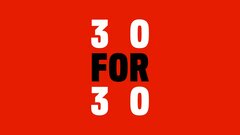
30 for 30Stream
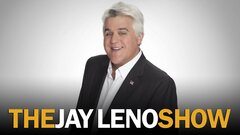
The Jay Leno Show

Basketball Man
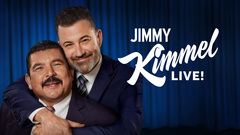
Jimmy Kimmel Live!Stream
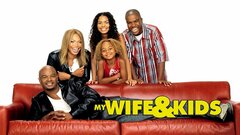
My Wife and KidsStream

Michael Jordan: To the Max

1996-'97 Chicago Bulls Championship Season

Jammin' With Bugs & Michael

Space Jam
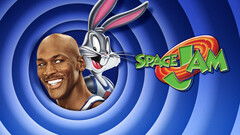
Space JamStream

Space JamStream

Marathon
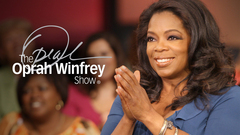
The Oprah Winfrey Show

Good Morning America

Saturday Night LiveStream

TodayStream
News aboutMichael Jordan
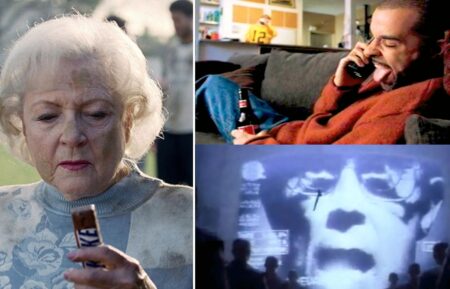
17 Best Super Bowl Commercials of All Time
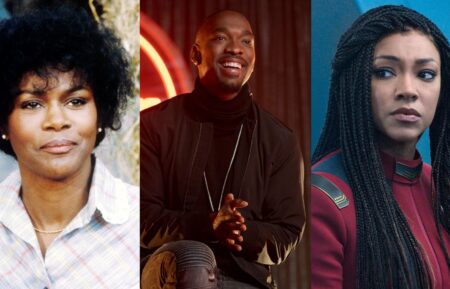
Black History Month 2022: Your Complete TV & Streaming Guide
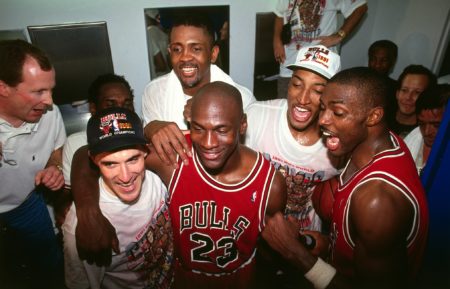
Preview
Did You Miss ‘The Last Dance’? Stream the Michael Jordan Doc on Netflix
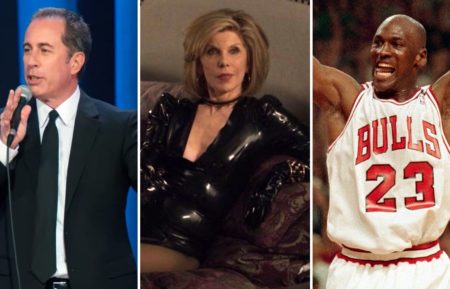
Best Lines of the Week (May 1-7): ‘All You Have to Do Is Listen’
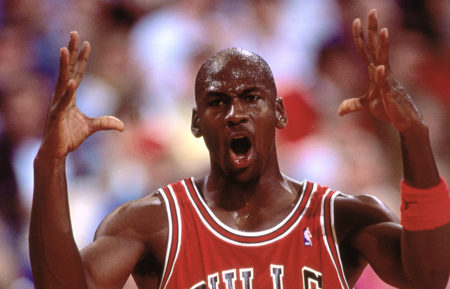
Preview
You’ll Want to Stay Until the Very End of ESPN’s ‘The Last Dance’
